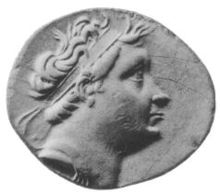Nicomedes IV of Bithynia — Nicomedes IV Philopator, was the king of Bithynia, from c. 94 BC to 74 BC. He was the first son and successor of the Monarchs Nicomedes III of Bithynia and Nysa[1] and had a sister called Nysa.[2] There is nothing known about Nicomedes IV s birth … Wikipedia
Nicomedes I of Bithynia — Nicomedes I (Greek: Nικoμήδης; lived c. 300 BC – c. 255 BC, ruled 278 BC – c. 255 BC), second king of Bithynia, was the eldest son of Zipoetes I, whom he succeeded on the throne in 278 BC.[1] Overview He commenced his reign by putting to death… … Wikipedia
Nicomedes III of Bithynia — Nicomedes III Euergetes (Ancient Greek: Νικομήδης Εὐεργέτης Nikomḗdēs Euergétēs) was the king of Bithynia, from c. 127 BC to c. 94 BC. He was the son and successor of Nicomedes II of Bithynia by an unnamed woman. The first wife of Nicomedes… … Wikipedia
Nysa (wife of Nicomedes III of Bithynia) — Nysa or Nyssa (Greek: Νύσ(σ)α, flourished second half of 2nd century BC) was a Princess from the Kingdom of Cappadocia in Anatolia. Nysa was a monarch of Greek Macedonian and Persian ancestry. She was the daughter and first born child of the… … Wikipedia
Nysa (daughter of Nicomedes III of Bithynia) — Nysa or Nyssa (Greek: Νύσ(σ)α, flourished second half of 2nd century BC and first half of 1st century BC) was a Greek Princess from the Kingdom of Bithynia. Nysa was the daughter of the Monarchs Nicomedes III of Bithynia and Nysa.[1] She was the… … Wikipedia
Nicomedes — may refer to: Nicomedes (mathematician), ancient Greek mathematician who discovered the conchoid Nicomedes, uncle of the 19th Agiad Spartan king Pleistoanax, commanded the Spartan army at the Battle of Tanagra Saint Nicomedes, Martyr of unknown… … Wikipedia
Bithynia — was an ancient region, kingdom and Roman province in the northwest of Asia Minor, adjoining the Propontis, the Thracian Bosporus and the Euxine (today Black Sea).DescriptionSeveral major cities sat on the fertile shores of the Propontis (which is … Wikipedia
Bithynia — Bithynian, adj., n. /bi thin ee euh/, n. an ancient state in NW Asia Minor. * * * Ancient country, northwestern Anatolia. Bounded by the Sea of Marmara, the Bosporus, and the Black Sea, it was settled by Thracians in the late 2nd millennium BC.… … Universalium
BITHYNIA — I. BITHYNIA Asiae minoris regio ad Pontum sira, Thraciae adversa, Troadi proxima, Solino, c. 44. Servio, et Martiano Capellae. ubi duo Concilia Oecumenica, et Chalcedone, ubi simile Concil. celebris. Capellae primum Bebrycia, postea Mygdonia,… … Hofmann J. Lexicon universale
List of rulers of Bithynia — This page lists rulers of Bithynia, an ancient kingdom in northwestern Anatolia.Dynasts of Bithynia ? 328 BC and Kings of Bithynia, 328 75/74 BC*Boteiras ? 376 BC *Bas 376–326 BC *Zipoites I 326 278 BC *Nicomedes I 278 255 BC *Zipoites II 278 276 … Wikipedia
 This article incorporates text from a publication now in the public domain: Chisholm, Hugh, ed (1911). Encyclopædia Britannica (11th ed.). Cambridge University Press.
This article incorporates text from a publication now in the public domain: Chisholm, Hugh, ed (1911). Encyclopædia Britannica (11th ed.). Cambridge University Press.
